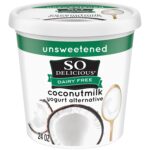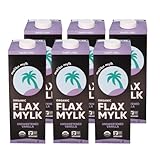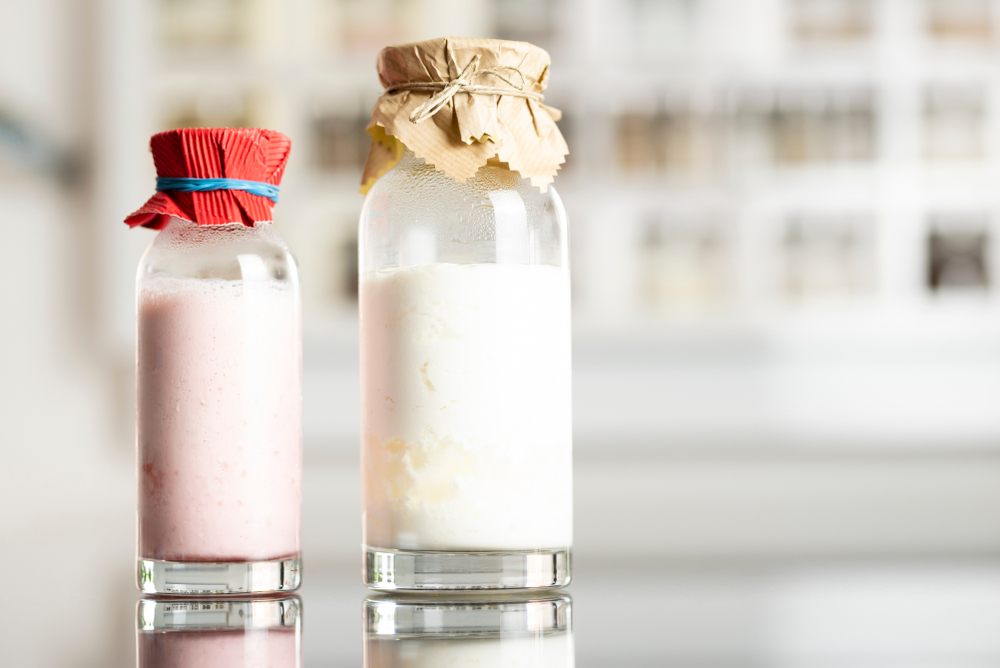Whether you’re a new or more seasoned Paleo diet enthusiast, some foods bring up a bit of a question mark. Some strict Paleo followers insist on eating only foods that our “caveman” ancestors had access to. Others include some foods that aren’t technically Paleo because of their health benefits. Dairy products are one example of foods that aren’t typically included in a Paleo diet, but some people are choosing to include some dairy in their Paleo lifestyles.
Kefir is not considered Paleo because it’s made from cow’s milk. However, some people choose to include kefir in their Paleo lifestyle because of the potential health benefits of fermented foods. Some Paleo-friendly kefir alternatives include SO Delicious Unsweetened Plain Coconut Milk Yogurt, Forager Project Organic Unsweetened Dairy-Free Drinkable Yogurt, and Malibu Mylk Unsweetened Vanilla Flax Mylk.
To learn more about kefir, how it’s made, its nutritional benefits, and true Paleo-friendly kefir options – read on!
Contents
Refresher course – what’s a Paleo diet?
The Paleolithic diet is otherwise known as “Paleo” or “the caveman diet. The primary goal of the Paleo diet is to eat foods that our caveman ancestors ate thousands of years ago through hunting and gathering. The Paleo diet includes foods like meat, fish, fruits, vegetables, nuts, and seeds. It avoids foods that became popular once farming began, such as dairy, legumes, grains, and refined sugars.
Potential Benefits of the Paleo Diet
Low in refined sugars
The Paleo diet is low in refined sugars compared to the typical Western diet. The majority of sugar-sweetened foods are sweetened with refined sugars like cane sugar and corn syrup. This means that your added sugar intake would likely decrease if you adopted a Paleo diet.
Avoids refined carbohydrates
Many of the grains consumed in a Western diet are refined grains such as white bread, white pasta, and others. Refined grains are lower in fiber and other nutrients. Because the Paleo diet is free of these grains, there is more room for more nutrient-dense foods like sweet potatoes, nuts, seeds, and vegetables.
Might help symptoms of certain autoimmune disorders
Some people find some relief from symptoms of their autoimmune disorders while following a paleo diet, such as those suffering from Crohn’s disease. The “Autoimmune Protocol”, an extension of the Paleo diet, has been scientifically proven to reduce symptoms in inflammatory bowel diseases like ulcerative colitis and Crohn’s disease.
What is kefir?
Kefir is a fermented drink made from the milk of cows, goats, or sheep. It’s similar to Greek yogurt nutrition-wise but has a thinner consistency.
Kefir is more tangy and sour than plain unsweetened yogurt. For this reason, many types of kefir are sweetened to make them more palatable. The problem with that is that refined sugars aren’t Paleo-friendly, so many commercial types of kefir might not be suitable for a Paleo diet.
What’s the difference between kefir and yogurt?
Both kefir and yogurt are fermented milk products. Yogurt is made with cultured bacteria while kefir is made with kefir grains. However, it’s possible to make kefir without kefir grains, more similar to yogurt. You can buy kefir grains or get a kefir starter to make your kefir.
What are kefir grains?
Milk kefir grains are considered the “mother” culture and are made up of polysaccharides, which are complex sugars. These sugars contain both bacteria and yeasts. These grains have a gelatinous feel to them and have a similar look as cauliflower.
What are the benefits of kefir?
Probiotics
Fermented foods like kefir are rich in probiotics. Probiotics are beneficial bacteria that help your immune system. Probiotics might also be beneficial for:
- Preventing bowel diseases
- Improving the immune system
- Treating lactose intolerance and other intestinal imbalances
- Lowering cholesterol
- Lowering blood pressure
- Alleviating postmenopausal disorders
- Reducing traveler’s diarrhea
- Treating skin and oral diseases
Lower in lactose compared to milk
Kefir made from cow’s milk is typically lower in lactose than plain cow’s milk. The healthy bacteria in kefir ferment the milk sugars, meaning less sugar is left over for you to have to digest. Lifeway, the most popular manufacturer of ready-to-drink kefir, states that kefir is “99% lactose-free”.
Rich in calcium
Like other dairy products, kefir is rich in calcium. Certain types of kefir also have vitamin D added, which is important for bone health as well as immune health.
What are the downsides of kefir?
It can be high in sugar
Flavored versions of kefir are usually sweetened with added refined sugars like cane sugar or corn syrup. These sweeteners aren’t Paleo-friendly. In addition, consuming large amounts of added sugar carries many health risks including an increased risk of chronic diseases.
It can give some people digestive upset
If you’re not used to eating fermented foods, you might want to start slowly. One of the most common side effects of eating fermented food is bloating.
Is kefir Paleo?
Technically kefir isn’t Paleo because traditional kefir is made from cow’s milk. Kefir made from Paleo-friendly non-dairy milk is considered Paleo-friendly. However, it’s difficult to find ready-made kefir from these types of milk, so you’ll probably be left to make your own.
Some people consider kefir from cow’s milk Paleo-friendly even though dairy isn’t technically Paleo. The argument for including cow’s milk kefir is that fermented foods provide a multitude of health benefits. Some Paleo diet followers are starting to include some dairy products into their diet because of the nutritional benefits they have to offer.
Other ingredients in kefir that might not be Paleo
Commercial kefir can include ingredients (such as thickeners and sweeteners) that aren’t considered Paleo-friendly. The Paleo diet typically avoids processed foods because our prehistoric ancestors didn’t have access to such processed foods.
Kefir Nutritional Information
Lifeway Lowfat Milk Plain Kefir
This is one of the few commercial kefir brands that offer unsweetened kefir.
Ingredients:
- Pasteurized Cultured Lowfat Milk
- Nonfat Milk
- Pectin
- Vitamin A Palmitate
- Vitamin D3
Nutrition facts (per one cup):
- Calories: 110
- Total Fat: 2 g
- Saturated Fat: 1.5 g
- Total Carbohydrate: 12 g
- Sugars: 12 g
- Added Sugar: 0 g
- Sugars: 0 g
- Protein: 11 g
- Calcium: 30% DV
- Vitamin D: 25% DV
Lifeway Organic Plain Whole Milk Kefir
This is similar to the first type of kefir, but it’s made with whole milk instead of low-fat milk.
Ingredients:
- Pasteurized Cultured Organic Grade A Milk
- Pectin
- Vitamin D3
- Probiotics:
- Lactobacillus Lactis
- Lactobacillus Rhamnosus
- Streptococcus Diacetylactis
- Lactobacillus Plantarum
- Lactobacillus Casei
- Saccharomyces Florentinus
- Leuconostoc Cremoris
- Bifidobacterium Longum
- Bifidobacterium Breve
- Lactobacillus Acidophilus
- Bifidobacterium Lactis
- Lactobacillus Reuteri
Nutrition facts (per one cup):
- Calories: 160
- Total Fat: 8 g
- Saturated Fat: 5 g
- Total Carbohydrate: 12 g
- Sugars: 12 g
- Added Sugar: 0 g
- Protein: 10 g
- Calcium: 30% DV
- Vitamin D: 25% DV
- Probiotics:
- Lactobacillus Lactis
- Lactobacillus Rhamnosus
- Streptococcus Diacetylactis
- Lactobacillus Plantarum
- Lactobacillus Casei
- Saccharomyces Florentinus
- Leuconostoc Cremoris
- Bifidobacterium Longum
- Bifidobacterium Breve
- Lactobacillus Acidophilus
- Bifidobacterium Lactis
- Lactobacillus Reuteri
Lifeway Greek Style Plain Whole Milk Kefir
This kefir is thicker in consistency, similar to how Greek yogurt is thicker than regular.
Ingredients:
- Pasteurized Cultured Whole Milk
- Cream
- Pectin
- Vitamin D3
- Probiotics:
- Lactobacillus Lactis
- Lactobacillus Rhamnosus
- Streptococcus Diacetylactis
- Lactobacillus Plantarum
- Lactobacillus Casei
- Saccharomyces Florentinus
- Leuconostoc Cremoris
- Bifidobacterium Longum
- Bifidobacterium Breve
- Lactobacillus Acidophilus
- Bifidobacterium Lactis
- Lactobacillus Reuteri
Nutrition facts (per one cup):
- Calories: 200
- Total Fat: 13 g
- Saturated Fat: 8 g
- Total Carbohydrate: 12 g
- Sugars: 12 g
- Added Sugar: 0 g
- Protein: 8 g
- Calcium: 30% DV
- Vitamin D: 25% DV
- Probiotics:
- Lactobacillus Lactis
- Lactobacillus Rhamnosus
- Streptococcus Diacetylactis
- Lactobacillus Plantarum
- Lactobacillus Casei
- Saccharomyces Florentinus
- Leuconostoc Cremoris
- Bifidobacterium Longum
- Bifidobacterium Breve
- Lactobacillus Acidophilus
- Bifidobacterium Lactis
- Lactobacillus Reuteri
This Chick Is Raw Original Raw Living Coconut Milk Kefir
This is one of the few ready-made types of kefir made with Paleo-friendly milk.
Ingredients:
- Raw Hand Broken Fresh Coconuts
- Fermented Coconut Milk
- Probiotic Blend (Dairy-Free)
Nutrition facts: not available
Paleo-Friendly Kefir Alternatives
Many types of kefir use cow’s milk, which is a no-go for many Paleo followers. Here are some true Paleo-friendly alternatives to kefir:
SO Delicious Unsweetened Plain Coconut Milk Yogurt
 Coconut milk products are a good Paleo-friendly alternative. Coconut milk yogurt isn’t rich in protein like regular milk, but it contains live active cultures similar to kefir.
Coconut milk products are a good Paleo-friendly alternative. Coconut milk yogurt isn’t rich in protein like regular milk, but it contains live active cultures similar to kefir.
Ingredients:
- Organic Coconut Milk (Filtered Water, Organic Coconut Cream)
- Rice Starch
- Contains 2% or Less of:
- Pectin
- Calcium Phosphate
- Dipotassium Phosphate
- Live and Active Cultures
- Locust Bean Gum
- Vitamin D2
- Vitamin B12
- Live and Active Cultures
- S. Thermophilus
- L. Rhamnosus
- L. Acidophilus
- L. Bulgaricus
- Bifidobacterium spp.
- L. Casei
- L. Paracasei
- L. Plantarum.
Nutrition facts (per 3/4 cup):
- Calories: 90
- Total Fat: 6 g
- Saturated Fat: 5 g
- Total Carbohydrate: 9 g
- Dietary Fiber: 2 g
- Total Sugars: 1 g
- Added Sugar: 0 g
- Protein: <1 g
Forager Project Organic Unsweetened Dairy-Free Drinkable Yogurt
 This is a great option that is similar to kefir in texture but is made with Paleo-friendly ingredients. It’s also free of any sweeteners, so you can drink it plain or add it to smoothies for more flavor.
This is a great option that is similar to kefir in texture but is made with Paleo-friendly ingredients. It’s also free of any sweeteners, so you can drink it plain or add it to smoothies for more flavor.
Ingredients:
- Cashew Milk (Filtered Water, Cashews*)
- Tapioca Starch*
- Coconut Cream*
- Live Active Cultures:
- S. Thermophilus
- L. Bulgaricus
- B. Bifidum
- B. Lactis
- L. Acidophilus
- L. Casei
- L. Paracasei
- L. Plantarum
- L. Rhamnosus
*Organic
Nutrition Facts (per one cup):
- Calories: 120
- Total Fat: 8 g
- Saturated Fat: 1.5 g
- Total Carbohydrate: 8 g
- Total Sugars: 1 g
- Added Sugar: 0 g
- Protein: 3 g
Malibu Mylk Unsweetened Vanilla Flax Mylk
 Flaxseeds are incredibly rich in omega-3 fatty acids. Most diets are unbalanced and high in omega-6 fats with not enough omega-3 fats. Omega-6 fats can be pro-inflammatory, especially when omega-3 fats aren’t also included in the diet.
Flaxseeds are incredibly rich in omega-3 fatty acids. Most diets are unbalanced and high in omega-6 fats with not enough omega-3 fats. Omega-6 fats can be pro-inflammatory, especially when omega-3 fats aren’t also included in the diet.
This flax “milk” contains probiotics similar to kefir and is certified Paleo-friendly. It’s also rich in fiber, helping to feed the good bacteria in your digestive system.
Ingredients:
- Organic Flax Mylk (Purified water, Organic flaxseed)
- Less than 1% of the Following:
- Organic Acacia Gum
- Gellan Gum
- Organic Vanilla Extract
- Pink Himalayan Salt
- Organic Cinnamon Powder
Nutrition Facts (per 8 oz):
- Calories: 45
- Total Fat: 3 g
- Saturated Fat: 0 g
- Total Carbohydrate: 4 g
- Dietary Fiber: 4 g
- Total Sugars: 0 g
- Protein: 2 g
Related Questions
Is kefir yogurt?
Kefir is similar to yogurt, but it isn’t considered yogurt. Kefir is thinner in consistency and is typically sour and tart-tasting than yogurt. Kefir is often made with kefir grains to ferment the milk, unlike yogurt.
Is kefir better than yogurt?
Kefir typically contains more probiotics than yogurt, so that makes it a better choice if you’re eating it for the probiotic content. Kefir is lower in protein than many types of Greek yogurt, which is a downside.
Is kefir lactose-free?
Kefir is considered very low in lactose, making it more suitable for people with lactose intolerance or those following a low FODMAP diet.
